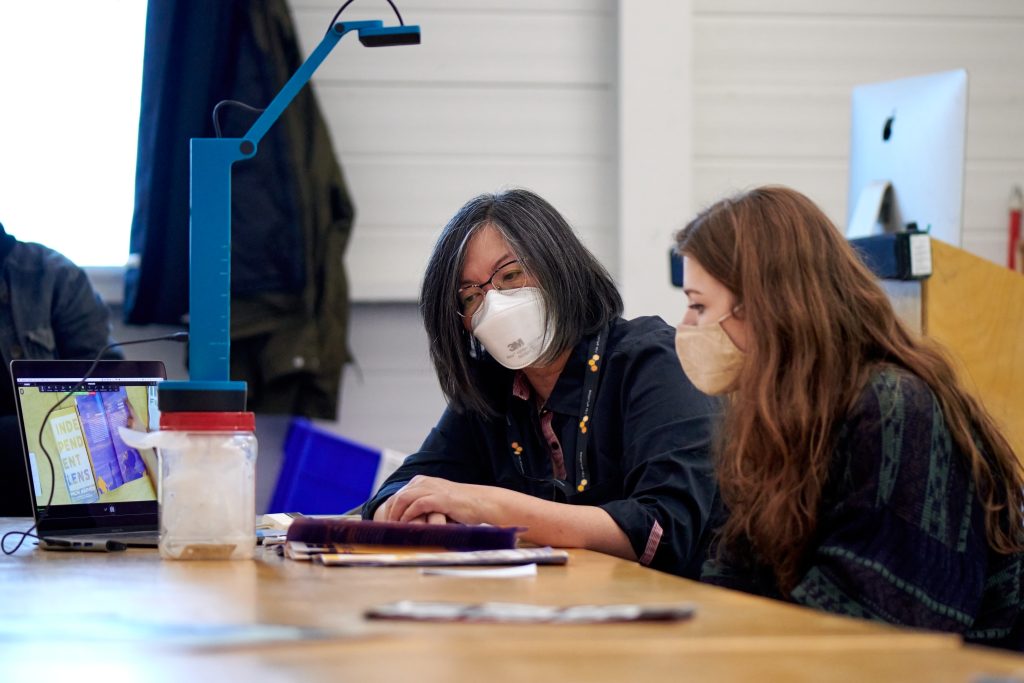Accessibility and accommodations
Welcome to NSCAD Accessibility Services! We are a resource for students who identify as having a disability. Find out how we support students, who we are, and how and when to get in contact with us.
Definitions and policy documents

NSCAD defines disability in accordance with the Accessible Canada Act which explains disability as:
“any impairment, including a physical, mental, intellectual, cognitive, learning, communication, or sensory impairment-or a functional limitation- whether permanent, temporary or episodic in nature, or evident or not, that, in interaction with a barrier, hinders a person’s full and equal participation in society.”
NSCAD's essential policy documents
To learn more about NSCAD’s policies and protocols on accessibility, we encourage all students, staff and faculty to be familiar with these documents.
Academic accommodations
Accessibility office staff support students to deliver fair and equitable learning opportunities by providing recommendations for modifications or adjustments of how to meet program outcomes. These modifications and adjustments are called “academic accommodations”.
Accessibility office staff work with students one-on-one to gain an understanding of the students lived experience with their disability and to review relevant medical documentation. The information provided by the student to the accessibility staff is used to inform personalized academic accommodations.
The academic accommodations are provided to the student’s instructors and technicians to be implemented in the classroom and studio. Examples of academic accommodations include, but are not limited to:
- Additional time for writing exams
- Note taking support
- Extensions on assignment deadlines
- American Sign Language (ASL) Interpreters.
Referrals and funding options
By meeting one-on-one with accessibility staff, students living with disabilities can also explore funding options through the “Canadian Student Grant for Equipment and Services for Students with Disabilities” for services (tutors, American Sign Language Interpreters, note takers, etc) and equipment (noise cancelling headphones, ergonomic furniture, speech to text software, etc).
The accessibility office can also provide students with referrals to external accessibility service providers such as psychologists, Autism Nova Scotia programs and supports, and ADHD coaching.
Register with Accessibility Services
The first step in getting support is to contact us.
Please book an in-person or online appointment by clicking on the green button above. You will have the opportunity to discuss your accessibility needs, requests for accommodation and receive support with applying for equipment and service funding.
If you have documentation of a disability or existence of a medical condition in which you would benefit from accommodation (from a registered psychologist, social worker, registered counselling therapist, psychiatrist, medical doctor, occupational therapist, physiotherapist or other medical specialist), a formal diagnosis is not required.
At minimum, documentation should include a statement indicating the existence of a disability or medical condition that could benefit from accommodation. Documentation of a persistent or prolonged disability should be recent (completed within the last five years), or since the individual was aged 18 or older.
Please use the ‘Submit documentation here’ link below.
If you require support with submitting documentation, please contact accessibility@nscad.ca.
If you do not have documentation, please continue with booking an appointment and the Accessibility Learning Strategist can offer guidance and support with obtaining documentation.
Welcome to the Form Portal!
Your log in name is the first part of your NSCAD email (without “@nscad.ca”). Your password should be the same as your email password.
Please submit documentation of your disability via the form portal.
Renew Accommodation Letters
Every term, students must renew their accommodation letter to have it sent to their new instructors. Please click on the green button below, which connects you to the Accessibility Requests Form.
Courseload status for students registered with Accessibility Services
Students with a documented disability that are registered with the Accessibility office are considered as full-time when taking at least a 40% course load, which is equivalent to 6 credits (except for those in the MAED program-please contact accessibility@nscad.ca for more information).
If you are taking at least 6 credits, you are eligible to:
- be considered a full-time student loan funding
- receive a student bus pass
- be covered under the NSCAD student health plan
If you are taking 6 credits, please contact accessibility@nscad.ca to notify the Accessibility Office so they can ensure that you receive your bus pass and are covered under the health plan. Please note that if you are taking 9 credits or more, you are already considered full-time and do not need to notify the Accessibility Office.
CONTACT US

Jess Johnson (she/her/hers)
Accessibility Advisor
Office of Student Experience
jjohnson@nscad.ca
